How to Find a Dog to Adopt
Learn more about how you can find a dog shelter that meets your expectations.
Learn more about how you can find a dog shelter that meets your expectations.
by Courtney Elliott, | November 1, 2023

Lucas Ottone / Stocksy
Ask any pet parent — there’s nothing better than puppy kisses, nose boops, and the pure tail-wagging joy that comes with having a pup by your side. If you’re thinking about adopting a dog, the journey to your perfect pup might seem a bit daunting. There are so many options out there, from shelters and rescue organizations to online platforms like Adopt a Pet and even social media. Not sure where to begin your search? With a bit of research and a lot of patience, you’ll meet your new BFF in no time.
Start your search on Adopt a Pet. If you don’t see your perfect pup right away, type your email address into the New Pet Alerts box, then click the confirmation link in the signup email. That’s it. New pets who match your search criteria will be emailed to you once a day.
Use Adopt a Pet’s search to find pets for adoption.
Enter your zip code then click the search button.
Browse all pets near you or filter by age, sex, breed, and even color.
Sign up for New Pet Alert email notifications.
Embarking on the journey to find a dog soulmate is an exciting adventure, and there are many ways to approach it. From tapping into your personal network to connecting with dedicated rescue organizations, the path to adopting your ideal canine companion is as diverse as the pups themselves. Here’s how to find a dog to adopt and tips to help you choose the perfect route for your journey.

Thinking of adopting a rescue dog? Learn more about the challenges of dog rescue and how you can help transition a new friend into your home.
Before you even think about googling “how to find a dog to adopt,” it’s important that you figure out what type of dog you’re looking for. Depending on the age, size, breed, and temperament of a dog, your experience can be vastly different. Choosing one that’s compatible with your lifestyle will ensure that you and your pup will have a long, happy life together. For example, a prospective pet parent who’s in the office five days a week and travels frequently will likely have different criteria than a stay-at-home freelancer who only works a few hours a day — but we’ll dive more into that later.

Looking to adopt? Here are some helpful guidelines on finding a reputable pet rescue organization.
Surfing the web isn’t just for cat memes and viral videos; it’s your ticket to a world of adorable, adoptable pups. Adopt a Pet makes it super easy to find available dogs in your area, allowing you to customize your search by adding your preferred location, age, and breed. Once you enter your search, Adopt a Pet serves up a list of pet profiles that match your criteria — don’t be ashamed if you find yourself scrolling through them for hours…they’re just too cute. If you find one (or ten) you’re interested in, you can click the “Ask About Me” button and connect directly with the shelter or rescue organization to learn more.
When using the internet to find a dog to adopt, it’s very important to use reputable sites. Unfortunately, there are a lot of scammers out there who prey on pet parent hopefuls and falsely advertise available pups. Stick to well-known websites, such as Adopt a Pet, and save Craigslist for finding used furniture (or maybe don’t).

Whether you’ve found a potential pooch online first and want to go meet them or are casually strolling by, visiting a local animal shelter or rescue organization means you get to see the available adoptables IRL. There are a few subtle differences between shelters and rescues. Shelters generally have a broader focus, accepting various breeds and types, while rescue organizations typically take in fewer animals, are “no-kill,” and specialize in specific breeds or types of pets. Keep in mind, there’s a good chance you won’t be able to meet any pups unless there’s a scheduled event or you’ve coordinated a meet-and-greet in advance, so make sure you plan ahead.
Another important reminder: There’s typically a lot of paperwork, multiple interviews, and a home visit involved when you adopt a dog, especially through a rescue organization. While this is a good thing and ensures that dogs find responsible pet parents, the process can take a while and require some time and attention. Don’t get discouraged if an adoption doesn’t work out and know that a pup will find their way home to you soon. With that said, before you dive into the adoption process, it can be helpful to prepare answers to specific questions you might be asked — for example, questions about your work schedule, home type and features (small apartment, big backyard), past pets, and personal and professional references. That way, once you find one you like, you’ll already be one step ahead.
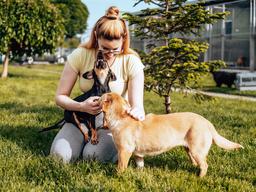
If you’re in search of a pup with a big personality in an adorably small package, you’ve come to the right place.
If you’ve already determined which breed is the best for you, many rescue organizations specialize in certain breeds. Consider reaching out to these breed-specific rescues to inquire about available dogs — they often have a deeper understanding of the breed’s needs and characteristics and can help match you with the perfect companion.
Social media and online forums are other places where people post adoptables. And the best place to look for pets is through pages or groups for official 501(c)(3) rescue and local shelters. They’ll post tons of photos, adorable videos, and stories about available dogs. If you’re not having any luck finding a good match, look to your Facebook feed — Karen from high school may just be rehoming her mom’s adorable Terrier and perhaps it’s time to slide into her DMs.
Avoid people you don’t know or anything that’s been posted anonymously. Ultimately, use caution when using these platforms. These can be ripe with ill-intentioned or dishonest people, so unless you actually know the person advertising an available pup, it’s best to stick with some of the other options.
One of the best ways to find a four-legged family member is to ask people you know. Ask where they found their pets or see if they know anyone who may be rehoming a dog. Adopting within your network may provide a dog with the chance to be rehomed and still be in contact with their original pet parent under certain circumstances. When you go this route, you’re also less likely to have to jump through lots of hoops or fill out loads of paperwork, but depending on the situation, you may have less information about the dog’s behavior, health history, and prior care, which can be a difficult place to start from.
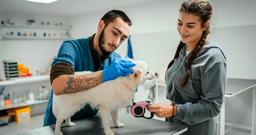
Pet parenthood can be tough, but finding the right vet doesn’t need to be. These tips will help you find the right vet for your pup.
Veterinarians are the most connected people in the pet world. They’ll likely know reputable rescues or are even fostering a pup of their own. Many vets and vet techs take in pets that have sadly been left behind due to the financial burden of medical bills on the pet parent or for some other reason. Check in with your local veterinarian about any adoptable dogs they know of, and you might be surprised at how many ideas come to mind.
Finding the right fit is extremely important when it comes to adopting a dog. The last thing anyone wants is for a pup in need to get matched with a home and get returned to the shelter shortly after. There are several factors to consider when choosing a dog to welcome into your family.
Lifestyle: Think about your daily routine and how a dog would fit into it. Are you more of a couch potato or an adventure seeker? Your lifestyle will influence the type of dog that’s the best match for you.
Activity level: Consider your energy level and how much exercise you can provide. High-energy dogs might need more playtime, while lower-energy breeds are happy with shorter walks and more snuggles.
Size: Do you have enough space for a big, lovable lug, or are you looking for a pocket-sized pup? The size of your home and yard plays a role in this decision.
Age: Puppies are adorable, but they need training and patience. Older dogs might be a better fit if you prefer a more settled and relaxed companion.
Temperament: Think about your personality and what you’re looking for in a furry friend. Some dogs are outgoing and sociable, while others are more reserved.
Health history: Understanding a dog’s health history is crucial. It helps you prepare for potential medical expenses and any special care they might need.
Budget: Dogs come with costs beyond adoption fees, like food, grooming, and veterinary care. Consider your budget and ensure it covers your dog’s needs comfortably.
Experience: How much experience do you have as a pet parent? This is an important one that can be easy to overlook because there are definitely some dog breeds that are better for first-time pet parents (and some that aren’t).
While the goal is always to find loving homes for pups in need, there are a few key differences between shelters and rescues. Shelters and humane societies are like temporary waystations for dogs, often housed in kennels or larger facilities. They might have a mix of breeds and types, making it a bit like a doggie melting pot. Rescue organizations are like dog matchmakers with a special touch. They often have fewer pets and might even focus on particular breeds or types. Many dogs in rescues are living in foster homes, so you get the inside scoop on their personalities from experienced foster families. Plus, rescue organizations often have a “no-kill” policy, meaning they don’t euthanize animals due to space constraints. So, if you’re looking for a bit more assistance when adopting a dog, a rescue could be your best bet.
When you adopt a dog, you not only save a dog’s life and help break the cycle of pet overpopulation, but you also play a role in reducing animal cruelty. Adopting is usually less expensive than going to a breeder and many adopted dogs are already housebroken and trained. You’re basically getting a dog who’s ready to settle into your home — after an adjustment period. And the best part? You’re gaining a lifelong friend who’ll be there for all the adventures and cozy snuggles.
Acquiring a Pet Dog: A Review of Factors Affecting the Decision-Making of Prospective Dog Owners

Courtney Elliott, a proud Cleveland native living in Manhattan, blends her decade of writing and editing expertise with her unshakable devotion as a pet parent to her French Bulldog, Gus. When she’s not at her desk, you’ll find her frolicking in Central Park or engrossed in a good book at a local coffee shop.
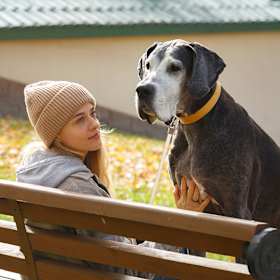
Adoption Advice

Adoption Advice
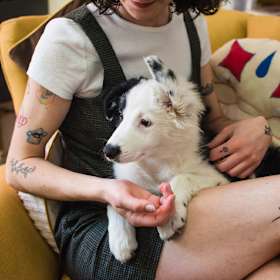
Adoption Advice

Adoption Advice
Getting a dog can be the best thing you ever do — if you’re prepared.

Adoption Advice
Wondering how old your dog is? We can help! Here’s how you can determine your dog’s age.

Adoption Advice
It’s a big decision, so check these boxes before you sign on the dotted line.
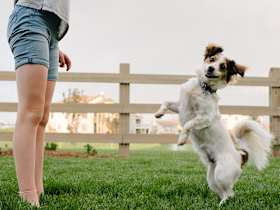
Adoption Advice
Learn the many benefits of adopting a dog from a shelter or rescue, and why giving a dog a second chance at a home is truly rewarding.

Breed Info
Looking for a pup to match your lifestyle? These are the top canine companions of the year, perfect for everyone from adventurers to couch potatoes.

Adoption Advice
Did you just bring home an adorable puppy?

Adoption Advice
Considering dog adoption? Learn the differences between adult dog and puppy adoption to find your perfect match.

Adoption Advice
Preparing for a new puppy with kids? Read our guide for insights on creating a harmonious bond between your children and new puppy.

Adoption Advice
Adopting a dog is a BIG decision. If you’re considering getting a new pup, consider a foster-to-adopt program to test the waters first.